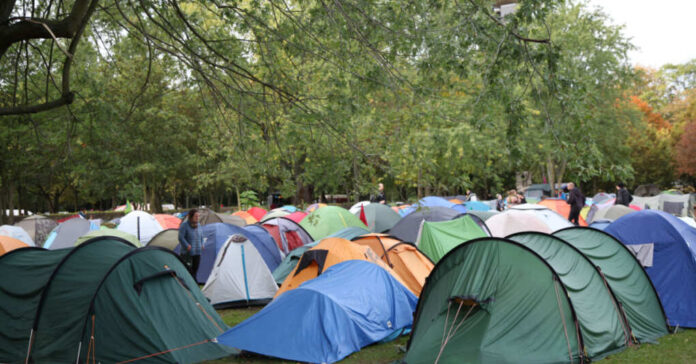Since spring 2022, 140,000 undocumented guests have graced New York City’s overwhelmed intake system. With over 65,000 of these “asylum seekers” still clinging to the city’s hospitality and a steady stream of newcomers, Mayor Eric Adams is singing the blues, lamenting the exhaustion of good options to shelter the migratory masses. In response, the city has opened over 200 sites, including 15 humanitarian relief centers.
But “grateful” illegal immigrants have turned their backs on the latest site to open its doors to them, a “pod city” set at Brooklyn’s Floyd Bennet Field that was intended to house 2000 “asylum seekers.”
Unlike the typical family shelters previously enjoyed by the undocumented in New York City, the migrants at Floyd Bennett Field were slated to share communal spaces.
In a valiant attempt to keep up with demand, the city has already unveiled over 200 sites, including 15 humanitarian relief centers. But the latest venture at Brooklyn’s Floyd Bennet Field failed to win the hearts of the undocumented migrants. Upon arrival, they hopped back on the bus, bidding farewell to pod life before it even began and opting for the familiar luxury of Manhattan hotels. They cited concerns about the kids’ school and city jobs alongside a lack of kitchens and private spaces in the pods.
Assemblywoman Jaime Williams watched in bewilderment as migrants strolled past Floyd Bennet Field’s entrances like they were on a leisurely city tour. Some claimed ignorance of the pod city’s housing facilities, with one man calling the accommodations “ridiculous” and vowing to return to his posh hotel. Another migrant, while arranging for a train ride back, lamented, “This is crazy.”
Adams touted the facility, stating it was safe for the “asylum seekers” and their families, but the arriving illegal immigrants were suitably unimpressed. Some of them, including a man who had brought his family to the site, said they were not informed of the nature of the site. Calling the carefully planned tent city “ridiculous,” he pointed out that his children attended school in the Bronx. “We’re going back,” he declared. Another migrant said he planned to take the train back to 455th Street, saying he “had not been informed” where the shelter was. “I can’t stay here,” he lamented. “This is crazy.”
Williams quickly reversed course on her prior bafflement, claiming that after speaking to the migrants, she understood their desire to leave the site. She explained that the “asylum seekers” were scared and didn’t want to be at Floyd Bennet Field. She also echoed their concerns that the site was too far from established schools and called it a “disaster waiting to happen.” She observed that winter was coming, highlighting it as a concern for the “pod city” residents.
Not everyone shared Williams’ empathy. The initial bus driver, surprised at the migrants’ departure, noted that only a handful stuck around. But Adams pointed out that some from the first bus and a handful from subsequent ones seemed grateful for the pod city’s protections.
Adams has already committed over $5 billion in nearly 200 contracts for migrant services since last year’s state of emergency declaration. Adams anticipates the crisis to cost the city $12 billion over three years, prompting budget cuts affecting services for residents. In response to the migrant surge, Adams modified the ‘Right to Shelter’ law in May, seeking federal and state assistance. He has expressed concern that the influx of asylum seekers could potentially “destroy New York City.”
It turns out that the pod city pales compared to the five-star extravagance of other Adams-backed initiatives. A high-end hotel in Long Island City, The Collective Paper Factory, was transformed into a migrant haven, and the “asylum seekers” couldn’t stop raving. Two beds, a fancy bathroom, private kitchenettes, and “spacious and beautiful “rooms left them singing the trendy hipster hotel’s praises. One worker even Face Timed a friend to flaunt the site’s luxury living arrangements, noting, “When you say shelter, you don’t think of this. The other one looked like a shelter. This one doesn’t.” She added additional perks of The Collective Paper Factory, including free housing, food, electricity, and water.”
It seems asylum is a selective pursuit, demanding only the finest accommodations for those seeking refuge from life’s hardships—especially if you’re hopping borders without an invite.



















